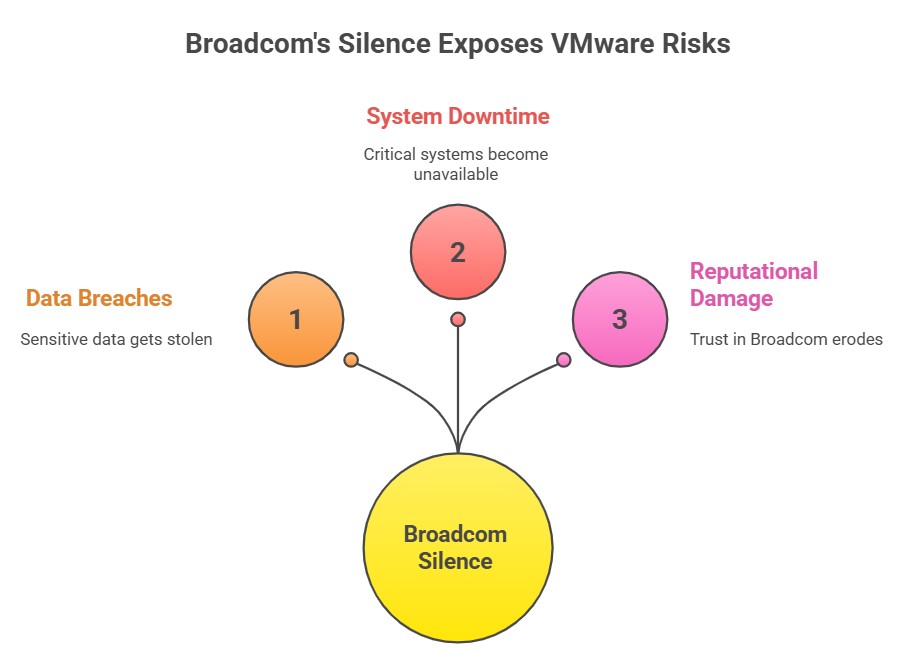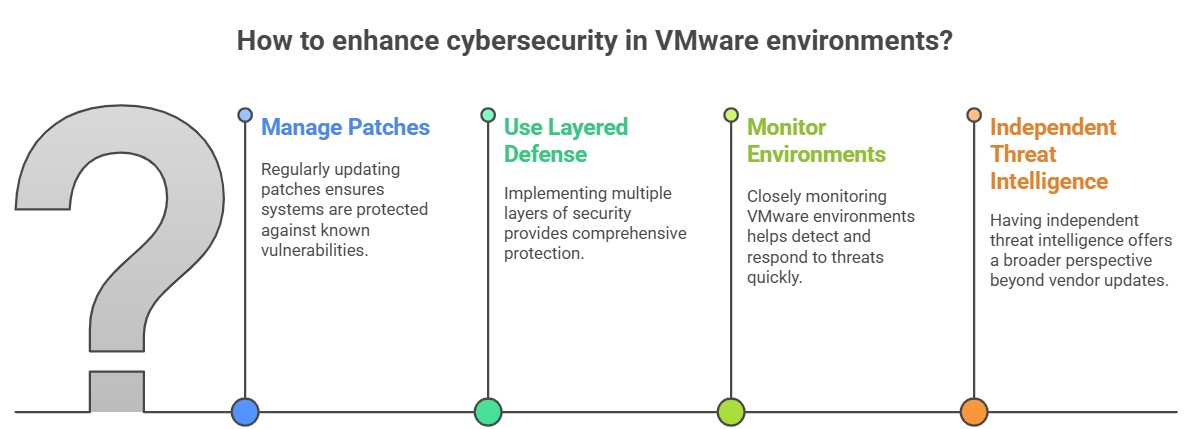Broadcom VMware Zero-Day Vulnerability Raises Alarms

Hoplon InfoSec
02 Oct, 2025
It started out quietly, like a whisper in a room full of people. A few security researchers saw strange things happening in VMware environments. At first, the signs looked like another round of normal probing. But as forensic analysis dug deeper, the disturbing truth began to come to light. There was a zero-day vulnerability in Broadcom VMware that attackers were actively using, and the worst part was that no one knew about it. Broadcom knew about it. Customers didn't.
This story is more than just another news story about cyber threats. It's about trust, responsibility, and what happens in the real world when a big tech company isn't open. Companies that use VMware aren't small. These are the things that make up modern life: banks, hospitals, airlines, and stores. There is a huge ripple effect when hackers leave a silent hole open.
Why Broadcom's lack of response is suspicious
Being open about cybersecurity is more than just being polite. It helps you stay alive. Every day counts when there is a hole in your system if you run a data center or cloud platform. But Broadcom stayed quiet while a Broadcom VMware zero-day flaw was being used in the real world.
Why would they do that? Companies often say that going public too soon gives hackers a plan. But keeping information from people until it's too late makes things even worse. Companies miss out on the chance to protect themselves, and trust starts to fade. For Broadcom, which was already in the news for buying VMware, this silence seemed more like a business decision than a careful plan.
What Is a Zero-Day Attack, Exactly?
A zero-day attack is like someone finding an open back door in your house before you even know the lock is broken. Hackers find the flaw first, and while the company tries to fix it, criminals move in quickly. The term "zero-day" comes from the fact that there are no days of warning or protection.
Attackers could get into environments that were supposed to be very secure with the Broadcom VMware zero-day vulnerability. VMware lets you run thousands of virtual servers on one computer. It's like having termites in the base of a skyscraper if one of those layers gets broken.
What VMware Does in the Digital World
You need to know how important VMware is to understand how serious this problem is. Think of it as the framework that holds up digital infrastructure without being seen. VMware is used by banks to run safe financial apps. Hospitals use it to keep track of electronic health records. It is important for government agencies to use it.
The Broadcom VMware zero-day vulnerability is more than just a tech problem; it's a problem for the whole country. One exploited hole can stop supply chains, delay surgeries, or lock up money systems. That's the size we're talking about.
How the Exploitation Was First Found
The first signs came when cybersecurity teams saw strange patterns in the VMware ESXi logs. These scans were not the usual ones that run on their own. The attackers were careful and left small clues behind to hide their tracks. Security companies put together that the breach was real. It was happening right then.
That was when the question came up: if researchers saw it, Broadcom must have known. So why hadn't they called for help? Trust broke down in the time between finding out and telling someone.
The Order of Events That Happened
Based on leaked reports and expert analysis, the order of events seems to be as follows: attackers found the flaw months before Broadcom admitted it. Exploitation spread slowly through different fields. Some companies noticed the problem, worked around it, or made quick fixes. Broadcom only released a patch and a short statement after a lot of pressure.
This order is important because timing is everything. A zero-day disclosure that is even a week late can cause hundreds of businesses to be attacked. In this case, the delay lasted for months.
Broadcom's Past with Security Disclosures
People haven't always thought of Broadcom as an open company. Critics have long said that the company likes to keep things under control and only share a little bit of information. In this case, the choice not to fix the Broadcom VMware zero-day flaw right away fits with that story.
It is one thing to be careful with PR. Letting customers walk into a minefield without warning is a whole other story.

Why Some Businesses Don't Tell You About Security Flaws
Broadcom isn't the only one, to be fair. Many companies are afraid to admit their mistakes because they don't want to hurt their reputation, lose business, or give criminals a way to get into their systems. But there is a difference between being responsible and not saying anything at all.
Think about how it would feel to be driving a car and the company that made it finds out that the brakes might not work in some situations.
Would you rather they keep it a secret until they fix it, or would you rather they tell you so you can stay off the highways until then? Customers expect the same kind of logic when it comes to cybersecurity.
The Dangers of Using VMware for Business
This wasn't just a debate for schools; it was also for businesses. Because of the Broadcom VMware zero-day vulnerability, hackers could steal data, stop operations, and even hold important systems for ransom. Banks and other financial institutions risked having transaction data made public. Healthcare providers had to deal with the nightmare of patient records that had been hacked. Companies that make things might have to stop their production lines.
And here's the thing: a lot of these companies didn't know they were at risk because the information came out too late.
Effects on the Real World of Exploitation
Imagine a hospital in the middle of an emergency where its digital records stop working. Or an airline where the software that schedules crew members stops working. These aren't just movie stories. These are very real things that can happen when zero-day flaws aren't fixed.
When researchers looked into some intrusions, they found that attackers had been quietly sitting inside systems for weeks or even months. That means that compromised systems could have affected choices, transactions, and even medical care.
What Cybersecurity Experts Did
The security community was not quiet. Analysts said Broadcom was putting customers in danger. Some people even said that the government should step in. They thought that the Broadcom VMware zero-day vulnerability was more than just another mistake by a company; it was a dangerous example.
Experts are frustrated because they feel like they've been here before. They've seen companies stay quiet before, and then the damage got worse.
Pressure from the government and regulators
The government is keeping an eye on things. As cyberattacks become a threat to national security, regulators are asking for more openness. U.S. agencies have already been telling businesses to report breaches and weaknesses more quickly.
In this case, there were more and more calls for stricter laws about disclosure. If a vulnerability can put public safety at risk, shouldn't silence be seen as negligence?
What we learned from past zero-day attacks
There are many warnings in history. The WannaCry attack on the NHS in 2017, which used a zero-day exploit, shut down hospitals all over the UK. In 2021, Microsoft Exchange Server had security holes that let hackers break into computers all over the world. Slow disclosure made the damage worse every time.
The Broadcom VMware zero-day flaw could be added to that list of warnings.
What This Means for Cloud and Data Centers
VMware is what makes cloud platforms and data centers work. One zero-day exploit in that ecosystem can affect thousands of businesses. It's like an earthquake hitting not just one city but a whole area.
Broadcom needs to show that it will protect not only its shareholders but also the lives of its customers if it wants to keep people's trust.
Tips for businesses that use VMware
So what can businesses do in the meantime? Cybersecurity experts say that you should regularly manage patches, use layered defense strategies, and keep a closer eye on VMware environments. It's becoming necessary to have independent threat intelligence, not just updates from vendors.
In short, don't wait for Broadcom to tell you about a storm. Bring your own radar for the weather.

Is it possible for this to happen again?
Yes, unfortunately. There will always be zero-day flaws in complex systems. The real question isn't if they exist, but how quickly vendors tell people about them.
Broadcom's actions in this case show that companies may put their image ahead of honesty if they don't have to deal with outside pressure.
The Big Picture: Trust, Openness, and Responsibility
The main point of this story is that trust is not strong. Broadcom's choice not to quickly reveal the Broadcom VMware zero-day vulnerability could hurt its reputation for a long time. People can forgive mistakes. They can't stand silence, though.
The lesson for the industry is clear: being open and honest is not an option. It is the basis of trust in the digital world.
Source You Can Trust
Reuters: People are looking into Broadcom's VMware security flaw.
Gartner analysts said, "When vendors wait to tell businesses about active zero-day exploitation, they can't see risks they can't control." Even a little bit of openness is important for lowering the impact.
Hoplon Insight Box: Suggestions
• Move quickly; don't wait for vendors. Use independent security intelligence to find things that are out of the ordinary.
• Patch Smart: Keep your VMware environments up to date, but test patches before you install them to avoid downtime.
• Layered Defense: Make sure to use backups, segmentation, and intrusion detection.
• Demand Transparency: Get companies like Broadcom to promise to be more open about their business.
Explore our main services:
· Deep and Dark Web Monitoring
· ISO Certification and AI Management System
· Web Application Security Testing
Share this :